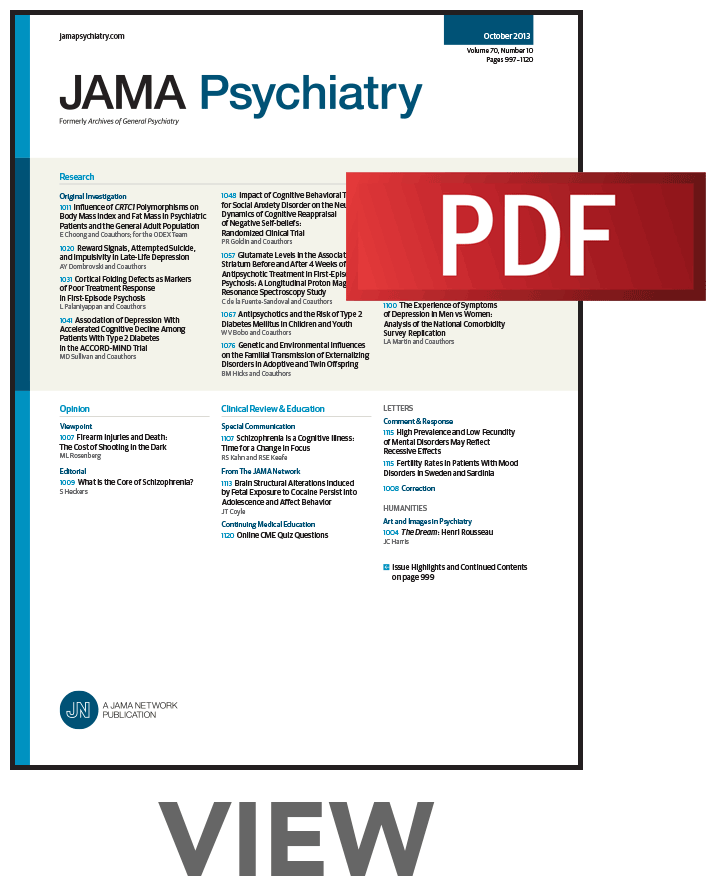Toward Equitable Interventions in Public Mental Health: A Review.
IF 22.5
1区 医学
Q1 PSYCHIATRY
引用次数: 0
Abstract
Importance The field of public mental health is evolving to tackle the profound impact of global challenges such as climate change, migration, and health crises. These issues accentuate health and social inequities, necessitating a focus on how to achieve interventions that are equitable and enhance mental health across all societal strata. Observations Population-based interventions can inadvertently exacerbate mental health inequities if they are primarily assessed by, and beneficial to, the most advantaged. Dimensional approaches such as the Hierarchical Taxonomy of Psychopathology offer a more nuanced understanding of mental health, capturing the whole spectrum of symptom severity in a culturally sensitive and less stigmatizing way. In addition, adopting intersectional, participatory, and settings-based approaches can help tailor interventions to the unique needs of marginalized groups. Conclusions and Relevance In moving toward more equitable interventions in public mental health, it is imperative to adopt an approach that integrates multiple frameworks to address the complexity of mental health inequities. At the core of this integrated approach is the recognition that mental health exists on a continuum. Intersectionality theory can help to identify the root (fundamental) causes of mental health while participatory and settings-based approaches ensure that interventions are relevant, culturally sensitive, and accessible to all. By adopting these approaches, interventions that are not only effective in "shifting the curve" toward better mental health, but are also equitable in their reach and impact, can be developed.实现公共心理健康的公平干预:回顾。
重要性公共心理健康领域正在不断发展,以应对气候变化、移民和健康危机等全球挑战的深远影响。这些问题加剧了健康和社会的不平等,因此有必要关注如何在社会各阶层实现公平的干预措施,并提高心理健康水平。意见基于人群的干预措施如果主要由最有优势的人群来评估并使其受益,则可能会无意中加剧心理健康的不平等。精神病理学层次分类法等维度方法提供了对心理健康更细致入微的理解,以文化敏感性和较少污名化的方式捕捉了症状严重程度的整个范围。此外,采用交叉性、参与性和基于环境的方法可以帮助定制干预措施,以满足边缘化群体的独特需求。结论与相关性在公共心理健康领域采取更公平的干预措施时,当务之急是采用一种整合多种框架的方法来应对心理健康不公平的复杂性。这种综合方法的核心是认识到心理健康是一个连续体。交叉性理论可以帮助确定心理健康的根本(根本)原因,而参与式方法和基于环境的方法则可以确保干预措施具有相关性、文化敏感性,并为所有人所接受。通过采用这些方法,可以制定出不仅能有效地 "改变曲线 "以改善心理健康,而且在覆盖范围和影响方面也是公平的干预措施。
本文章由计算机程序翻译,如有差异,请以英文原文为准。
求助全文
约1分钟内获得全文
求助全文
来源期刊

JAMA Psychiatry
PSYCHIATRY-
CiteScore
30.60
自引率
1.90%
发文量
233
期刊介绍:
JAMA Psychiatry is a global, peer-reviewed journal catering to clinicians, scholars, and research scientists in psychiatry, mental health, behavioral science, and related fields. The Archives of Neurology & Psychiatry originated in 1919, splitting into two journals in 1959: Archives of Neurology and Archives of General Psychiatry. In 2013, these evolved into JAMA Neurology and JAMA Psychiatry, respectively. JAMA Psychiatry is affiliated with the JAMA Network, a group of peer-reviewed medical and specialty publications.
 求助内容:
求助内容: 应助结果提醒方式:
应助结果提醒方式:


